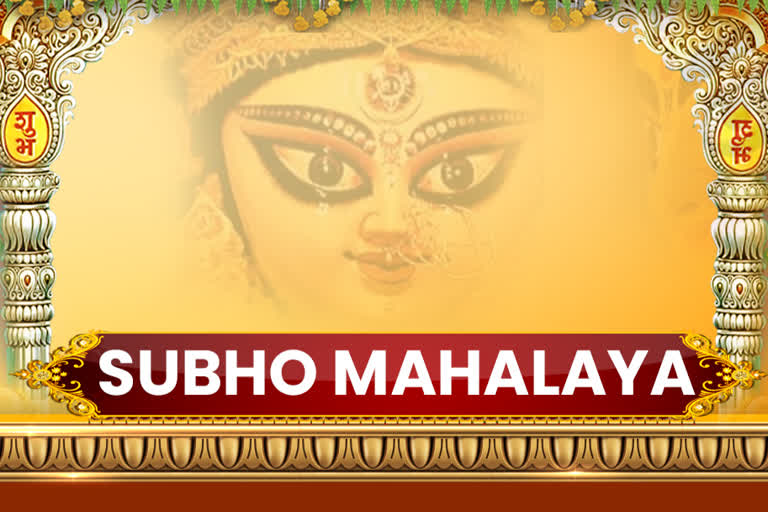Hyderabad:Mahalaya, which is celebrated every year, is an auspicious Hindu festival marks the end of Pitru Paksha Shraddha period and the beginning of Durga Puja. Bengalis across the globe eagerly wait for this day for the arrival of 'Goddess Durga' as it is believed that the Maa Durga officially begins her journey from Mount Kailash to her maternal home on Earth.
However, 2020 is not a regular year and this year, there is a gap of more than a month between the two dates. This time Durga Puja will be delayed and it will be observed 35 days after Mahalaya.
Valmiki also mentioned about 'Mahalaya' in Ramayana where Lord Ram invokes goodness to seek blessings from Maa Durga to free his wife Sita from the clutches of Ravana. Mahalaya is also considered as 'Akal Bodhan' (untimely worship of Goddess Durga).
On this sacred day, the Bangla community which celebrates the festival with much fervour ahead of the start of Durga Pujo, gather on the banks of the river Ganges to offer homage to their ancestors. 'Tarpan' is a ritual in which water is offered to the ancestors with prayers for peace to the departed souls. According to Hindu mythological belief, food and water are offered to the ancestors to quench their thirst and hunger.
A huge crowd is witnessed along the bank of the Ganges and people take a dip in the holy water on this pious occasion. Every Bengali household wakes up at 4 am in the morning, tunes into the radio to listen to the recital of Mahishasura Mardini by Birendra Krishna Bhadra on Mahalaya. Eight decades after it was first recorded, his reverberating voice still rules the heart of every Bengali.
Not only a great theatre director, a playwright but also a radio broadcaster, an actor and a narrator, Bhadra's scriptural verses of 'Sri Sri Chandi' holds a very place in the heart of the Bengalis. The entire programme, running for roughly one hour and 30 minutes, narrates the tale of Goddess Durga being created to save the gods from the torture inflicted upon them by the shape-shifting bull-demon Mahisasura. The narrative, recited by Bhadra, is interspersed with songs of welcoming the deity and praising her. The script was written by Bani Kumar.
READ: Don't let COVID-19 dampen festive spirit: Mamata on Mahalaya
The customary listening of the radio programme Mahisasura Mardini started with an All India Radio in 1931 and continues till date. Apart from Bhadra, Dwijen Mukhopadhyay, Pratima Bandyopadhyay, Shyamal Mitra, Sandhya Mukhopadhyay, Manabendra Mukhopadhyay, Arati Mukhopadhyay, Supriti Ghosh, Pankaj Kumar Mullick, Utpala Sen, Tarun Bandyopadhyay, Krishna Dasgupta, Sumitra Sen, Ashoka Bhattacharya, Shipra Bose, Bimal Bhushan and Dhananjaya Bhattacharya have also lent their heavenly voice for the song.
In an attempt to make 'Mahisasura Mardini' reach among the masses, the radio programme was once conducted by 'Mahanayak' Uttam Kumar in 1976. The script of the programme written by Hemanta Mukherjee named as Durga Durgatiharini' did not go down well with the audience and even the Bengali superstar failed to create the magic as Bhadra did. People's craze for Birendra Krishna Bhadra is unparalleled, hence unwilling to accept the change. The way Bhadra recites the chants in his melodious voice made his voice imprint in the hearts of the audience.
The 'unacceptable change' also sparked widespread outrage with people coming out on streets outside AkashVani. Mahusasura Mardini and Mahalaya go hand in hand.
Every year, on this day Bengali television channels deliver their own presentation of the grandeur of Devi Durga. Now Birendra's 'Mahisasuramardini' has its digital copies and is highly circulated across the community. There are also a number of YouTube uploads that contain the original recital. It can be heard from 4 pm IST on All India Radio as well as on its official website.
